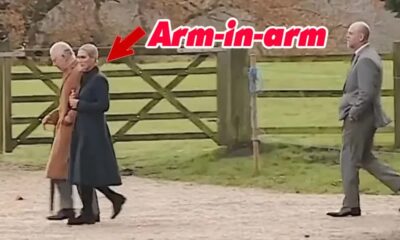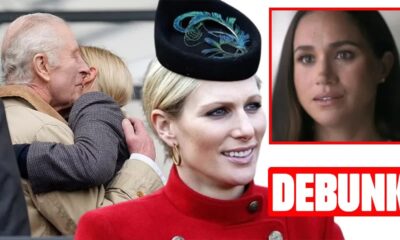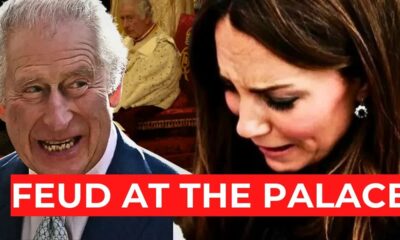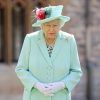All round
Hollywood actress Audrey Hepburn was a spy in WWII
Audrey Hepburn, the iconic Hollywood actress, had a secret life as a spy during World War II.
The new book Dutch Girl: Audrey Hepburn and World War II by Robert Matzen delves into her life during the conflict, shedding light on her work with the Dutch Resistance.
The book is based on secret files, interviews with Hepburn’s family, and diaries that Matzen has uncovered.
Hepburn, who passed away in 1993, had always been private about her past, but she had dropped hints about her involvement in the resistance.
Many will be surprised to learn about her heroic efforts during the war, as she was only 10 years old when it broke out, and her parents had been pro-fascist.
Trending:
- Meghan Markle Steals the Spotlight Again: A Royal Engagement Gone Awry
- “Harry and Meghan’s Tense Moment: A Marriage Under Scrutiny”
- Tension Unveiled: Frances Marquez’s Discontent with Meghan Markle in Colombia
- Elton John’s Scathing Remarks Leave Meghan Markle in Tears at Music Awards
- Meghan Markle’s On-Set Outburst: A Diva in Disguise?
Hepburn was born in Belgium in 1929 to an upper-class family. Her father worked in finance, and her mother, Baroness Ella van Heemstra, was a Dutch noblewoman.
In 1935, her father left the family and moved to London, leaving Hepburn and her mother with no money.
The abandonment had a significant impact on Hepburn, as she would later say, “I think it is hard sometimes for children who are dumped. It tortures a child beyond measure. They don’t know what the problem was.”
In December 1939, Hepburn and her mother moved to Holland as war was brewing. The family was not wealthy, and they settled in a modest apartment in Arnhem.
Hepburn’s mother took a job selling furniture to make ends meet.
Interestingly, Van Heemstra had been a supporter of the Nazis, and she had even met with Hitler in Munich in 1935.
Germany invaded the Netherlands in May 1940, and the occupation was swift. Public signs were changed to German and swastika flags were flown.
Hepburn was just 11 years old at the time, and she would later recall, “In the schools, the children learned their lessons in arithmetic with problems like this: ‘If 1,000 English bombers attack Berlin and 900 are shot down, how many will return to England?’ ”
Despite the occupation, Hepburn found solace in dance. She had been introduced to ballet in England, and now she threw herself into it full force.
In 1940, she enrolled in a specialized school under a celebrated dance teacher.
She fell in love with the stage, and the shy and withdrawn child that she had been transformed into a confident performer.
However, relative normalcy was shattered in 1942 when Hepburn’s uncle was arrested by the Nazis. Her mother was also arrested, but she was released after a few days.
This event had a profound effect on Hepburn and her mother, and they decided to join the resistance.
Hepburn’s mother used her connections to gather information for the resistance, while Hepburn used her dancing skills to entertain the troops and gather information.
She also delivered messages and smuggled goods. The risks were high, and Hepburn knew that if they were caught, they would be executed.
Hepburn’s work with the resistance ended in 1944 when the allies liberated the Netherlands. She and her mother moved to London, where Hepburn continued her dancing studies.
After the war, Hepburn’s mother became a vocal anti-fascist, and Hepburn would later say, “I owe everything to the war. It gave me a chance to become a person.”
Hepburn’s secret life as a spy during World War II adds a new dimension to her legacy.
She was not just a talented actress but also a brave and courageous woman who risked her life for the freedom of her country.
Dutch Girl: Audrey Hepburn and World War II provides an in-depth look at her life during the conflict and gives readers a deeper understanding of the person behind the iconic Hollywood star.
Hepburn’s work with the resistance was not widely known, but it is clear that it had a significant impact on her life.
It gave her a sense of purpose and helped her to develop her sense of self. Her experience also gave her a deep appreciation for the importance of freedom and democracy, which is evident in her later work as a UNICEF Goodwill Ambassador.
After the war, Hepburn’s acting career took off. She starred in some of Hollywood’s most iconic films, such as Roman Holiday, Sabrina, and Breakfast at Tiffany’s, and won an Academy Award for her role in Roman Holiday.
She was also known for her elegance and grace, and she became a fashion icon.
Hepburn’s life was not without its struggles, however.
She suffered from chronic health problems, and she lost her son, Sean, to a drug overdose in 1993. She passed away later that year at the age of 63.
Despite her untimely death, Hepburn’s legacy lives on.
She remains one of Hollywood’s most beloved actresses, and her work with the resistance during World War II adds a new dimension to her story. Dutch Girl: Audrey Hepburn and World War II is a must-read for fans of Hepburn and for anyone interested in learning more about this fascinating period in history.


























































































